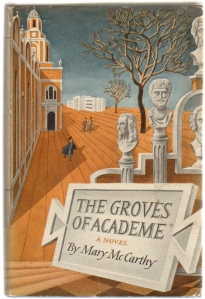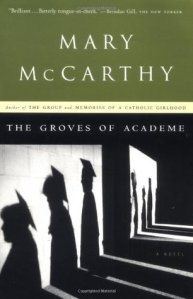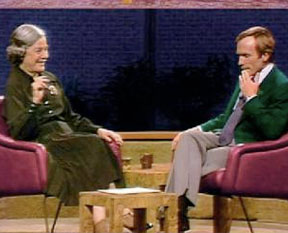 Mary McCarthy is best-known for The Group, her outrageously candid, entertaining novel about eight Vassar graduates, class of 1933. It has the funniest scene ever about being fitted for a diaphragm.
Mary McCarthy is best-known for The Group, her outrageously candid, entertaining novel about eight Vassar graduates, class of 1933. It has the funniest scene ever about being fitted for a diaphragm.
Her bad moment came when she was learning how to insert the pessary by herself…. As she was trying to fold the pessary, the slippery thing, all covered with jelly, jumped out of her grasp and shot across the room and hit the sterilizer. Dottie could have died.
 And I have been reading McCarthy’s earlier satires, which are actually more effective than her famous women’s novel.
And I have been reading McCarthy’s earlier satires, which are actually more effective than her famous women’s novel.
The Groves of Academe, a satire of an experimental college during the (Joseph) McCarthy era, is clever, polished, and surprisingly twisted. It was published in 1951.
If you expect Kingsley Amis’s Lucky Jim or David Lodge’s Changing Places, brace yourself: the intellectual McCarthy generates a harrowing hilarity born of liberalism and her rejection of Catholicism. McCarthy, who was a member of the Partisan Review group in the 1930s and taught at Bard College and Sarah Lawrence College in the 1940s, takes no prisoners in her bitter skewering of academia. Every brilliant, bitter, sinuous sentence glitters with the mix of venom, idealism, maneuvering, lying, camaraderie, hostility, and cliquishness that characterizes academic politics.
And, as if to completely discombobulate the reader, the hero is unattractive and not even sympathetic.
Henry Mulcahy, a Joyce scholar and instructor at a small “progressive” college in Pennsylvania, learns that his contract will not be renewed. It is not a good time to be a leftist: he was fired from a university in California because of his radical writings in The Nation. He was hired as an instructor at Jocelyn solely because friends called in favors to Maynard Hoar, the liberal president of the college. Hoar stood up for freedom of political beliefs; now the budget has been cut and he has decided to stand down.
Henry has a satiric view of his situation, but he knew Jocelyn was the end of the line for him and his family.
He sat down at his desk, popped a peppermint into his mouth, and began to laugh softly at the ironies of his biography: Henry Mulcahy, called Hen by his friends, forty-one years old, the only Ph.D. in the Literature department, contributor to the Nation and the Kenyon Review, Rhodes scholar, Guggenheim Fellow, father of four, fifteen years’ teaching experience, salary and rank as instructor–an “unfortunate” personality in the lexicon of department heads, but in the opinion of a number of his colleagues the cleverest man at Jocelyn and the victim, here as elsewhere, of that ferocious envy of mediocrity for excellence that is the ruling passion of all systems of jobholders.
 Seeing no alternative, Hen manipulates his friends to intercede on his behalf: he says his wife Cathy has a severe heart condition and that any shock could kill her, and he implies that the FBI is out to get him and that Hoar has caved to pressure. He has a group of earnest supporters, including Domna, the youngest, most loyal member of the Literature department, and Alma Fortune, the department chair, who resigns on principle.
Seeing no alternative, Hen manipulates his friends to intercede on his behalf: he says his wife Cathy has a severe heart condition and that any shock could kill her, and he implies that the FBI is out to get him and that Hoar has caved to pressure. He has a group of earnest supporters, including Domna, the youngest, most loyal member of the Literature department, and Alma Fortune, the department chair, who resigns on principle.
But when they learn that Hen has lied (Cathy was ill after her last pregnancy, but isn’t now, and Hen was never a member of the Communist party), the group is furious. Although Hen is brilliant and popular, he is a lazy teacher, he doesn’t take the tutorials seriously, and turns in his paper work late. How far must they go to protect him?
McCarthy sketches a hilarious picture of the “progressive” college. The students have tutorials instead of classes, and major in whatever they want, even if it is Broch’s The Death of Virgil and they don’t know Latin. The faculty argues over the correct spelling of “catalogue” and whether the students should have a two-week field work period in January. (The teachers go on vacation during field-work period). Then there is the never-ending poetry conference where one of the more flamboyant poets speaks on Virgil.
The majority of the students present had never heard of the person being alluded to as the Mantuan; they supposed he was a modern poet whom their faculty had not yet caught up with–a supposition correct in a sense, as Howard Furness, maliciously grinning, remarked in his slippery voice afterwards.
I love McCarthy’s work, but she was a bit of a hellion. I remember in 1980 watching the Dick Cavett Show when she called Lillian Hellman a liar. She said, “[E]very word she [Hellman] writes is a lie, including `and’ and `the.'” Hellman sued , and the lawsuit only ended with Hellman’s death four years later. Two great underrated American women writers at each other’s throats! Tsk,tsk.


So glad to see you give us some Mary McCarthy. I practically know The Group by heart, and love her writing on Venice. And even though it’s not politically correct, I’m on her side against the odious Hellman!
LikeLike
The Group is an amazing book. I think McCarthy and Hellman are both great writers, but this was an unfortunate episode. Of course Hellman WAS writing fiction in her memoirs… and McCarthy was known for her sharp tongue. Oddly I am still startled by the whole thing!
LikeLike
A friend of mine put me off The Group so I ended up not reading my copy and giving it away. I’m not sure I am that mad about academia set nobels. Though she does sound like an interesting writer.
LikeLike
She is one of those great underrated American women novelists. It took me a couple of tries to appreciate The Group, but it is very good and is now one of my favorite novels. You might try A Charmed Life, much more likable than The Groves of Academe, which is very much about McCarthyism as well as college politics..
LikeLike
I’ve started but not finished two McCarthys which is very poor – I must try harder….
LikeLike
Try, try again!:) Actually, it took me a while to appreciate her, too. She’s versatile. I loved A Charmed Life.
LikeLiked by 1 person
Well my response to your blog is different from your other readers. You make me want to read the book really for the first time. I did not know that it was more than a coming-of-age novel about college girls. You are the first one I’ve read to show how the story mirrors the McCarthy era — there were thousands hurt. The academy was hit hard, not as hard as movies, but hard enough. It was important to stamp out liberal and socialistic thought. I see she was also mirroring what she saw in the world of careers, the partisan review. I wonder if Henry comes close to suicide? Yes she was dead wrong to attack Lillian Hellman in later years; they should have been allies, not friends. Doubtless personal animosities we don’t know enough about; Hellmann was not especially diplomatic, and McCarthy might have blamed her (!) for standing up for liberty, decency instead of admiring her courage. Women were then unusual in the ranks of these intelligentsia; it makes me wonder what was Dorothy Parker’s relationship to them.
At any rate, thank you for an intelligent assessment of parts of the novel rarely discussed. You make me think of Malamoud’s New Life — not silly mystery books about academia.
Ellen
LikeLike
Oops. I do see I was confusing _The Group_ with _The Groves of Academe_. I realized this when I went to my shelves: they seem to me twin books about the same era. Perhaps they should be packaged together. Ellen
LikeLike
You might really like The Groves of Academe: it is a very serious satire of the McCarthy era. I know you don’t usually care for academic satire, but this goes deeper. McCarthy is an intellectual, and this intellectualism probably makes this book less popular than some of the laugh-out-loud college satires.
(The Group has really grown on me over the years, by the way.)
LikeLike
The Group is an old favourite, and her memoir, A Catholic Girlhood was brilliant. Then I read The Company She Keeps, and was bitterly disappointed, because I hated it, and it put me off trying anything else… but on the strength of your review I might have a go at The Groves of Academe. I shall report back – if I can track down a copy!
LikeLike
She is so versatile! I agree about Memoirs of a Catholic Girlhood. There’s something for everyone, but I don’t like everything she writes, either. I didn’t really enjoy The Oasis, a satire of a group of intellectuals who form a Utopian commune. It was a satire of people who worked for The Partisan Review, and without knowing who they were it just wasn’t that funny. But I highly recommend A Charmed Life! It is comical, but I really liked the characters, and it has a lot of depth.
LikeLike
Pingback: Are University Towns Paradise? Jude the Obscure, Lucky Jim, The Groves of Academe, and Me – mirabile dictu